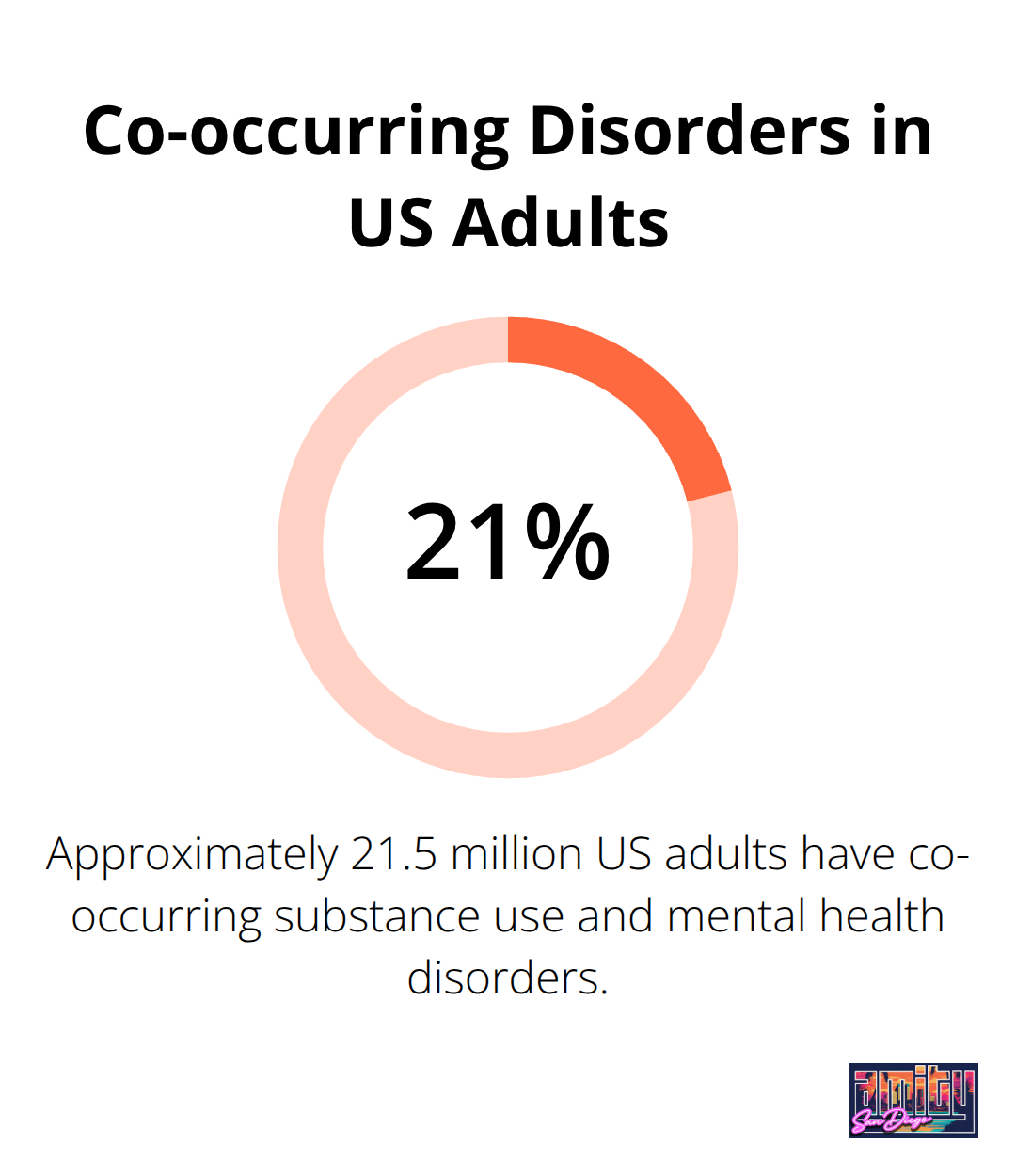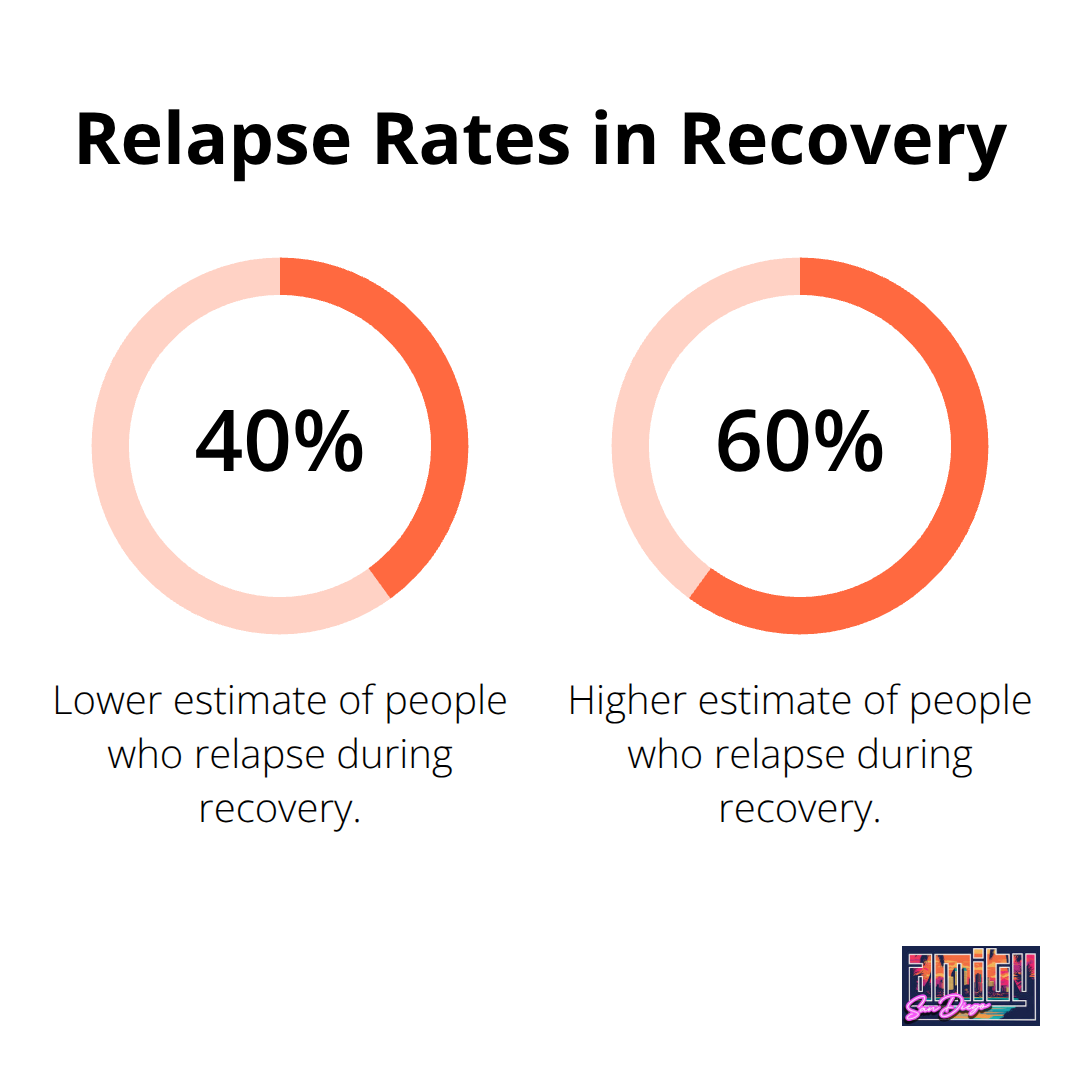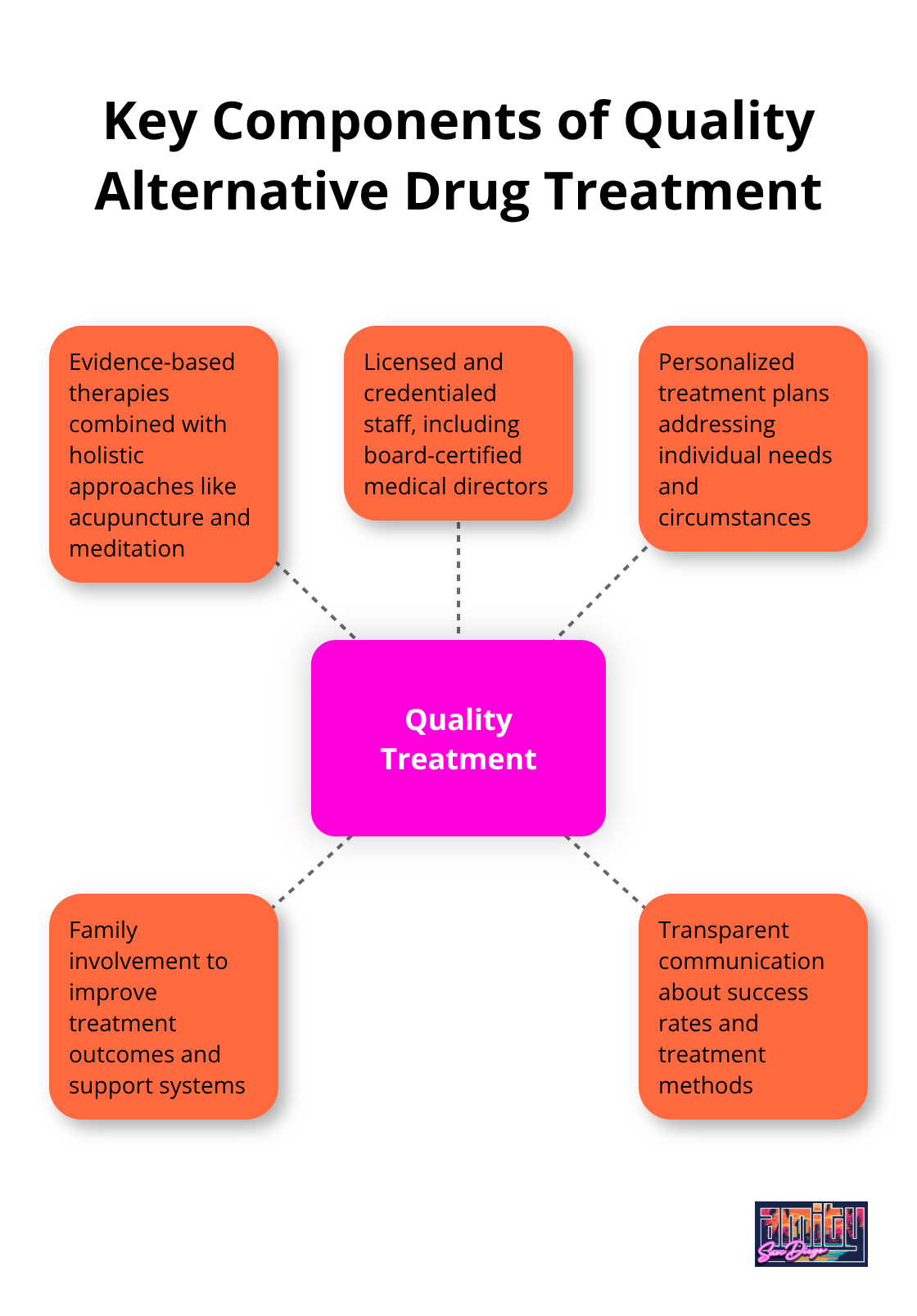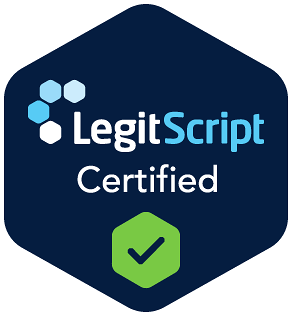Traditional rehab programs don’t work for everyone. Many people need different approaches that address their unique circumstances and preferences.
We at Amity San Diego understand that alternative drug treatment programs offer personalized solutions beyond conventional methods. These programs combine evidence-based therapies with innovative approaches to create comprehensive recovery paths.
What Alternative Treatment Options Are Available
Holistic Treatment Methods Transform Recovery
Holistic approaches address addiction through mind-body integration rather than focus solely on substance use. Research shows that mindfulness training can target neurocognitive mechanisms to produce significant therapeutic effects on substance use disorders. Art therapy decreases anxiety and builds coping strategies according to research in the Journal of Substance Abuse Treatment.
These programs combine cognitive-behavioral therapy with complementary practices like acupuncture, meditation, and nutritional counseling. Acupuncture specifically helps reduce withdrawal symptoms because it increases natural endorphin levels. Proper nutrition influences brain chemistry to minimize cravings and supports overall recovery.
Outpatient Programs Offer Flexibility Without Compromise
Outpatient alternative programs provide intensive treatment while they maintain daily responsibilities. Partial Hospitalization Programs deliver 20-25 hours of weekly therapy, while Intensive Outpatient Programs require 9-15 hours. These formats work particularly well for professionals who cannot take extended leave.
Studies show outpatient participants maintain higher employment rates and family connections compared to residential treatment. The key advantage lies in how participants practice recovery skills in real-world environments immediately. Many facilities now prioritize outpatient models because they produce comparable outcomes to inpatient care at significantly lower costs.
Specialized Co-Occurring Disorder Programs Address Root Causes
According to SAMHSA’s 2022 National Survey on Drug Use and Health, approximately 21.5 million adults in the United States have co-occurring substance use and mental health disorders, making integrated treatment essential. Programs that treat dual diagnosis simultaneously address depression, anxiety, PTSD, and addiction through coordinated care teams. The Substance Abuse and Mental Health Services Administration emphasizes that treatment of only addiction while it ignores underlying mental health issues leads to higher relapse rates.

Effective programs use trauma-informed approaches that recognize how exposure to childhood trauma increases one’s risk of addiction across classifications. These specialized tracks typically extend treatment duration but produce better long-term outcomes for participants.
Alternative Therapy Integration Creates Comprehensive Care
Modern alternative programs integrate multiple therapeutic modalities to address individual needs. Virtual reality therapy helps simulate triggers and teaches coping strategies without real-life exposure risks. Meditation and mindfulness practices reduce substance use and promote well-being according to research from the American Journal of Psychiatry.
Nutritional therapy focuses on diet as a recovery factor (studies indicate proper nutrition influences brain chemistry and reduces cravings). Exercise programs boost mood and reduce stress while they aid the recovery process. These integrated approaches create personalized treatment plans that address each person’s unique circumstances.
For those seeking comprehensive addiction treatment San Diego offers various alternative programs that combine these evidence-based approaches.
Once you understand the types of alternative programs available, you need to know how to research and evaluate these options effectively.
How Do You Research Treatment Programs Effectively
Start with specific questions that reveal actual practices rather than marketing claims. Ask treatment providers about their staff-to-client ratios, average length of stay, and completion rates. The Commission on Accreditation of Rehabilitation Facilities sets quality standards, defining the inputs, processes, and outcomes expected for programs serving individuals worldwide, so verify CARF accreditation status directly through their website. Request information about which evidence-based therapies they use and how they measure treatment outcomes. Programs that cannot provide concrete data about their success rates or refuse to discuss their methods should raise immediate concerns.
Verify Credentials and Track Records
Check that all clinical staff hold current licenses through your state’s board website. Medical directors should be board-certified in addiction medicine or psychiatry. Research shows that facilities with licensed clinical staff can provide valuable services through blended peer counselor and licensed clinician models. Look up the facility’s history with state health departments and check for any violations or sanctions. The National Association of Addiction Treatment Providers maintains directories of reputable facilities, but always verify credentials independently rather than rely on self-reported information.
Navigate Insurance and Payment Options
Contact your insurance provider directly to understand your behavioral health benefits before you speak with treatment centers. Most major insurance plans cover alternative treatment programs, but coverage varies significantly between inpatient and outpatient services (partial hospitalization programs often receive better coverage than residential care). Request detailed cost breakdowns from facilities and ask about payment plans if needed. Be wary of programs that demand large upfront payments or discourage insurance use. Legitimate programs will help you understand your benefits and work within your coverage limitations.
Evaluate Treatment Philosophy and Methods
Examine how programs integrate alternative therapies with evidence-based treatments. Quality facilities combine traditional approaches like cognitive-behavioral therapy with complementary practices such as acupuncture, meditation, or nutritional counseling. Ask about their treatment philosophy and how they customize programs for individual needs. Programs should explain their approach to co-occurring disorders and trauma-informed care (adults with dual diagnosis constitute 25.8% of those with any psychiatric disorder and 36.5% of those with any substance use disorder). Facilities that offer only one treatment method or refuse to adapt their approach may not provide comprehensive care.
These research steps will help you identify quality programs, but you also need to recognize warning signs that indicate substandard care. For comprehensive addiction treatment San Diego options, thorough research remains essential.
What Warning Signs Should You Avoid
Unrealistic Promises Signal Poor Understanding
Treatment facilities that guarantee recovery or promise specific timelines show fundamental misunderstanding of addiction science. The National Institute on Drug Abuse reports that 40-60% of people relapse during recovery, similar to other chronic diseases like diabetes and hypertension. Programs that claim 90% success rates or promise permanent cures manipulate vulnerable individuals who seek help. Legitimate facilities discuss realistic expectations and explain that recovery requires ongoing commitment rather than quick fixes.

Medical Supervision Protects Client Safety
Programs that operate without licensed medical staff or board-certified physicians put clients at serious risk. Withdrawal from alcohol, benzodiazepines, and opioids can cause life-threatening complications that require immediate medical intervention. The Substance Abuse and Mental Health Services Administration establishes staff qualifications for accredited programs (licensed clinical social workers, certified addiction counselors, and medical directors must meet these standards). Facilities that rely solely on peer counselors or unlicensed staff cannot provide comprehensive care.
Proper Credentials Matter for Quality Care
Always verify that clinical staff hold current state licenses and that medical directors maintain board certification in addiction medicine or psychiatry. State licensing boards provide online verification systems that allow you to check credentials independently. Programs that refuse to provide staff qualification information or discourage credential verification prioritize secrecy over transparency.
Family Involvement Improves Treatment Outcomes
Programs that discourage family involvement during treatment violate evidence-based practices. Research from the American Journal of Psychiatry shows family therapy improves treatment outcomes because it addresses relationship dynamics that substance use affects. Quality programs actively encourage family participation through education sessions, therapy involvement, and ongoing communication. Facilities that claim family contact disrupts recovery or charge excessive fees for family sessions prioritize profit over patient welfare (legitimate programs recognize that strong family support systems significantly reduce relapse rates and improve long-term recovery outcomes). For those seeking comprehensive care, consider addiction treatment San Diego options that prioritize evidence-based approaches.
Final Thoughts
Quality alternative drug treatment programs require systematic research and careful evaluation. Verify staff credentials through state boards and confirm CARF accreditation status. Ask specific questions about completion rates, staff-to-client ratios, and evidence-based therapies. Avoid programs that make unrealistic promises or discourage family involvement.
Personalized treatment approaches produce better outcomes because addiction affects each person differently. Programs that combine traditional therapies with holistic methods like acupuncture, meditation, and nutritional counseling address individual needs more effectively than one-size-fits-all solutions. Research shows that people who enter treatment have significantly better outcomes than those who attempt recovery alone (the National Institute on Drug Abuse confirms this through multiple studies).

Recovery requires action despite uncertainty or fear. Alternative drug treatment programs offer hope when traditional methods fall short. We at Amity San Diego provide comprehensive outpatient programs that integrate evidence-based treatments with personalized care, and our team creates individualized treatment plans for those ready to take the next step toward addiction treatment San Diego.



